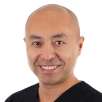Too often oral health care providers are appalled by the oral condition of residents from long term care facilities brought to the clinics. We oral health care providers are disgusted by the weeks of food and debris collected in the vestibules of those unaware it’s there. We cannot fathom someone coming to the office not having brushed their teeth, at least in the last year. We fume, we fret, we write nasty notes to the facility and feel righteously indignant. We also get positive feedback from our colleagues who have also seen the same thing.
What we don’t do is look at the conditions of the people we expect to provide oral care for dependent adults. The certified nursing assistant is often the person in charge of taking care of the oral condition of the dependent adults and if care facility. They have undergone a mere twelve weeks of training. Almost 30 minutes of that training is devoted to oral care. The instruction is often unrealistic, based on recommendations for ambulatory people full mental and physical capacity. The reality for the CNA is residents who cannot or will not sit passively as oral care is provided for them. Residents are often combative or resistant to attempts at oral care. Asking residents to sit still during brushing and flossing is often far too much to ask. It is far too much to ask of the resident, and far too much to ask of the CNA who is providing that care.
From our perspective a patient sits in our dental chair and complies with our every wish. At least for the time they are in the chair. For CNA, dealing with a resident is very much like dealing with a fully grown, 140-pound 3-year-old. Mentally they are unprepared for someone else providing them with oral care. They may hold their lips tightly together, they may turn their face away, they may even turn their face away until the caregiver is close enough and then they quickly turn back and bite the caregiver. This is quite common in long-term care facilities. It is almost unheard of in private practice. Certainly not by adults.
If CNA have hands on application to providing oral care, it is often done with other students in the class. This produces a problem. Students of the same age, often find this to be a hysterical exercise. The complications that present themselves in a true to life situation are almost never provided in this type of clinical setting. The lesson is lost in these young students.
The condition the mouth of someone who resides in a long-term care facility regardless of their age, very rarely resembles that of a twenty year old young woman. Often the teeth are broken, discolored, misaligned and most certainly covered with material alba from the Jurassic era. Studies show us that CNA are very happy with peri care and numerous other activities that are repulsive to most oral Healthcare providers. They often leave oral care to the very end of their shift, when too often they’ve run out of time in the day. That is the reality of the CNA.
The training of the CNA also leaves something to be desired. Their text books are written by nurses, even in the section on oral care. It is not common for a dentist or dental hygienist to be consulted for that section of the textbook. Terms are outmoded, and the instruction is not realistic for care in dependent adult populations. Only mechanical removal of biofilm is addressed. The most important aspect of oral care, reduction of biofilm, is almost never addressed.
I cannot call mechanical removal of biofilm will never go away. Brushing and flossing are always going to be important. However, continually stressing mechanical biofilm removal over the more likely biofilm reduction has made it nearly impossible for the CNA to even hear more about it. As tired we are of instructing on mechanical biofilm removal, they are of hearing it. With the advent of over-the-counter and professional products, biofilm reduction will be easier to achieve and all of us will be happier.
Who is Taking Care of the Dependent Patient’s Oral Health Every Day? Join us to find out!
On www.DTStudyClub.com, you will find the three-part Webinar series “Simple Advanced Treatment Modalities for the Dependent Patient” with Angie Stone and Shirley Gutkowski.
Part I: Who is Taking Care of the Dependent Patient Every Day?
Are you sick and tired of nursing assistants avoiding their duty to provide oral care to dependent adults? Find out how much you have in common with them! Angie Stone and Shirley Gutkowski bring their exciting tag team program to the Web in this first of three programs. They bring their no nonsense and humorous approach to build the bridges between “Us” and “Them.” Don’t miss this informative, scientific and entertaining program.
Part I of this series will educate the attendees regarding who is actually responsible for oral care in nursing home facilities. Attendees will learn what a typical day is like in the life of a nursing assistant, what education they have been provided and what their position is regarding oral care.
Learning Objectives:
• Understand the true daily work of the nursing assistant
• Know what education the nursing assistant has
• Understand who the nursing assistant is
Part II: The Dental Profession Can Assist Primary Caregivers Help Dependent Patients
Can’t get the nursing assistants to brush and floss the dependent adults they’re in charge of? Never fear, Shirley Gutkowski and Angie Stone show you how to make an impression on care-givers that will stimulate change by shifting your own thinking. Humorous and entertaining, you won’t be disappointed in quality and content of this important Web program.
Part II of this three part module will concentrate on what dental professionals should be teaching during the nursing home staff required annual in-service training session. Think you should be teaching brushing and flossing? Join us to find out!
Learning Objectives:
• Gain knowledge on how to develop an in-service training session
• Know what simple advanced treatment modalities improve the oral health of nursing home residents
• Understand the role Xylitol plays in oral health improvement
Part III: How to Implement Your Own Training Program Through the Adopt A Nursing Home Initiative
The alphabet soup of titles can be daunting to the oral care provider trying to bring the message of simple novel approaches to oral care in a facility. Angie Stone and Shirley Gutkowski, bring their hard earned knowledge and first-hand experience to this one-hour Web event. The third in the three part series on oral care for the dependent adult is just as entertaining as the first two. It covers who is working at the care facility, who to talk to, and when to call. Don’t miss this important information and round out your new perspective on care-givers and dependent adults.
Part III of this three-part module provides information on how to find a home to adopt. Discussions include: who are the main players in the nursing home environment that need to be contacted, what should be said when contacting the facility, as well as complete information regarding AANH.
Learning Objectives:
• Know who to contact at a facility to Adopt the nursing home
• Understand what to say to the facility administrators
• Know what the mission and goals are of AANH
Take advantage of this opportunity to earn 3 C.E. credits by logging onto www.DTStudyClub.com, Online Courses to register. Attendees will have access to the archived presentation for 30 days. All three Webinars are offered for US$95.
New research detailing the dental habits and preferences of Americans was presented to the public as a way to help bring attention to World Oral Health Day,...
SACRAMENTO, Calif., USA: The California Dental Association Foundation and the California Dental Association hosted a CDA Cares free dental clinic May 18-19 ...
SACRAMENTO, Calif., USA: A two-day dental clinic in Sacramento provided $2 million in charitable dental services to 2,080 people March 27-28. The event was ...
NEW YORK, N.Y., USA: The majority of Hispanics in the U.S. believe more information about good oral health habits, access to affordable oral health care, ...
Pentron Clinical Technologies, a company that specializes in post and core technology, recently introduced new Build-It Light Cure Core Material. According ...
FOUNTAIN VALLEY, Calif., US: Dentists and doctors will work under one roof and share access to patient records as part of a new partnership that aims to ...
BOSTON, Mass., USA: In an interview with Dental Tribune America conducted during the recent Yankee Dental Congress, Dr. Veronica Sanchez, global scientific ...
MIAMI, FL, USA: “This is our sixth year supporting the International Association for Dental Research’s Innovation in Oral Care Awards, said Stan...
Dr. Anne Koch, who is presenting two lectures at AAE17, received her DMD and Certificate in Endodontics from the University of Pennsylvania. She is founder ...
Your staff members are essential to the smooth functioning of your practice, and you rely on them to keep things going. But according to a 2014 report by ...
Live webinar
Tue. 16 April 2024
3:00 PM EST (New York)
Live webinar
Wed. 17 April 2024
10:00 AM EST (New York)
Live webinar
Wed. 17 April 2024
12:00 PM EST (New York)
Dr. Alexander Nussbaum Head of Scientific & Medical Affairs, Philip Morris GmbH, Dr. Björn Eggert
Live webinar
Wed. 17 April 2024
6:00 PM EST (New York)
Dra. Gabriella Peñarrieta Juanito
Live webinar
Thu. 18 April 2024
11:00 AM EST (New York)
Live webinar
Mon. 22 April 2024
10:00 AM EST (New York)
Prof. Dr. Erdem Kilic, Prof. Dr. Kerem Kilic
Live webinar
Tue. 23 April 2024
1:00 PM EST (New York)



 Austria / Österreich
Austria / Österreich
 Bosnia and Herzegovina / Босна и Херцеговина
Bosnia and Herzegovina / Босна и Херцеговина
 Bulgaria / България
Bulgaria / България
 Croatia / Hrvatska
Croatia / Hrvatska
 Czech Republic & Slovakia / Česká republika & Slovensko
Czech Republic & Slovakia / Česká republika & Slovensko
 Finland / Suomi
Finland / Suomi
 France / France
France / France
 Germany / Deutschland
Germany / Deutschland
 Greece / ΕΛΛΑΔΑ
Greece / ΕΛΛΑΔΑ
 Italy / Italia
Italy / Italia
 Netherlands / Nederland
Netherlands / Nederland
 Nordic / Nordic
Nordic / Nordic
 Poland / Polska
Poland / Polska
 Portugal / Portugal
Portugal / Portugal
 Romania & Moldova / România & Moldova
Romania & Moldova / România & Moldova
 Slovenia / Slovenija
Slovenia / Slovenija
 Serbia & Montenegro / Србија и Црна Гора
Serbia & Montenegro / Србија и Црна Гора
 Spain / España
Spain / España
 Switzerland / Schweiz
Switzerland / Schweiz
 Turkey / Türkiye
Turkey / Türkiye
 UK & Ireland / UK & Ireland
UK & Ireland / UK & Ireland
 International / International
International / International
 Brazil / Brasil
Brazil / Brasil
 Canada / Canada
Canada / Canada
 Latin America / Latinoamérica
Latin America / Latinoamérica
 China / 中国
China / 中国
 India / भारत गणराज्य
India / भारत गणराज्य
 Japan / 日本
Japan / 日本
 Pakistan / Pākistān
Pakistan / Pākistān
 Vietnam / Việt Nam
Vietnam / Việt Nam
 ASEAN / ASEAN
ASEAN / ASEAN
 Israel / מְדִינַת יִשְׂרָאֵל
Israel / מְדִינַת יִשְׂרָאֵל
 Algeria, Morocco & Tunisia / الجزائر والمغرب وتونس
Algeria, Morocco & Tunisia / الجزائر والمغرب وتونس
 Middle East / Middle East
Middle East / Middle East
:sharpen(level=0):output(format=jpeg)/up/dt/2024/04/Study-points-to-lack-of-formal-education-on-cannabis-in-dentistry.jpg)
:sharpen(level=0):output(format=jpeg)/up/dt/2024/04/Immediate-full-arch-zirconia-implant-therapy-utilising-the-power-of-robotic-assistance-and-digital-scanning_Fig-1-preophoto_title.jpg)
:sharpen(level=0):output(format=jpeg)/up/dt/2024/04/Lowcost-tooth-sensitivity-liquid-found-to-combat-caries-1.jpg)
:sharpen(level=0):output(format=jpeg)/up/dt/2024/04/DS-Academy-launches-Indirect-Restorative-Course-Series.jpg)
:sharpen(level=0):output(format=jpeg)/up/dt/2024/03/The-fight-continues-for-anaesthesia-safety-in-dentistry.jpg)








:sharpen(level=0):output(format=png)/up/dt/2024/01/UnionTech-Logo-Hub.png)
:sharpen(level=0):output(format=png)/up/dt/2014/02/MIS.png)
:sharpen(level=0):output(format=png)/up/dt/2015/09/Curaden.png)
:sharpen(level=0):output(format=png)/up/dt/2024/02/vVARDIS_Logo__BIOMIMETIC-DENTAL-SCIENCE_cropped.png)
:sharpen(level=0):output(format=png)/up/dt/2020/02/Camlog_Biohorizons_Logo.png)
:sharpen(level=0):output(format=png)/up/dt/2022/01/HASSBIO_Logo_horizontal.png)
:sharpen(level=0):output(format=jpeg)/up/dt/e-papers/330729/1.jpg)
:sharpen(level=0):output(format=jpeg)/up/dt/e-papers/330727/1.jpg)
:sharpen(level=0):output(format=jpeg)/up/dt/e-papers/330725/1.jpg)
:sharpen(level=0):output(format=jpeg)/up/dt/e-papers/325039/1.jpg)
:sharpen(level=0):output(format=jpeg)/up/dt/e-papers/325007/1.jpg)
:sharpen(level=0):output(format=jpeg)/up/dt/e-papers/313543/1.jpg)
:sharpen(level=0):output(format=jpeg)/up/dt/2010/03/3d99c7e577ebce95cd02c929c7b7a4e7.jpg)

:sharpen(level=0):output(format=jpeg)/up/dt/2024/04/Study-points-to-lack-of-formal-education-on-cannabis-in-dentistry.jpg)
:sharpen(level=0):output(format=gif)/wp-content/themes/dt/images/no-user.gif)
:sharpen(level=0):output(format=jpeg)/up/dt/2022/03/00_mouth-1437756.jpg)
:sharpen(level=0):output(format=jpeg)/up/dt/2017/01/1dc735af5279942f4177b522a2d9d6b6.jpg)
:sharpen(level=0):output(format=jpeg)/up/dt/2017/01/9d474310385d34cb5cc949736c580436.jpg)
:sharpen(level=0):output(format=jpeg)/up/dt/2017/01/def7fcaa39233820559158994e082d60.jpg)
:sharpen(level=0):output(format=jpeg)/up/dt/2010/05/60943c0d3c72307669c5d4b072830d42.jpg)
:sharpen(level=0):output(format=jpeg)/up/dt/2022/12/New-partnership-to-integrate-medical-and-oral-care.jpg)
:sharpen(level=0):output(format=jpeg)/up/dt/2017/01/a45fd58cf0bc4c44c0313e174ffaa051.jpg)
:sharpen(level=0):output(format=jpeg)/up/dt/2017/01/06c93853c2b6bffbd672f5a936209faf.jpg)
:sharpen(level=0):output(format=jpeg)/up/dt/2017/04/5e908385957129aff3f039a794bc8bae.jpg)
:sharpen(level=0):output(format=jpeg)/up/dt/2017/01/3b45cf2974863222d25097e3273d7dc6.jpg)







:sharpen(level=0):output(format=jpeg)/up/dt/2024/04/Study-points-to-lack-of-formal-education-on-cannabis-in-dentistry.jpg)
:sharpen(level=0):output(format=jpeg)/up/dt/2024/04/Immediate-full-arch-zirconia-implant-therapy-utilising-the-power-of-robotic-assistance-and-digital-scanning_Fig-1-preophoto_title.jpg)
:sharpen(level=0):output(format=jpeg)/up/dt/2024/04/Lowcost-tooth-sensitivity-liquid-found-to-combat-caries-1.jpg)
:sharpen(level=0):output(format=jpeg)/up/dt/e-papers/330727/1.jpg)
:sharpen(level=0):output(format=jpeg)/up/dt/e-papers/330725/1.jpg)
:sharpen(level=0):output(format=jpeg)/up/dt/e-papers/325039/1.jpg)
:sharpen(level=0):output(format=jpeg)/up/dt/e-papers/325007/1.jpg)
:sharpen(level=0):output(format=jpeg)/up/dt/e-papers/313543/1.jpg)
:sharpen(level=0):output(format=jpeg)/up/dt/e-papers/330729/1.jpg)
:sharpen(level=0):output(format=jpeg)/up/dt/e-papers/330729/2.jpg)
:sharpen(level=0):output(format=jpeg)/wp-content/themes/dt/images/3dprinting-banner.jpg)
:sharpen(level=0):output(format=jpeg)/wp-content/themes/dt/images/aligners-banner.jpg)
:sharpen(level=0):output(format=jpeg)/wp-content/themes/dt/images/covid-banner.jpg)
:sharpen(level=0):output(format=jpeg)/wp-content/themes/dt/images/roots-banner-2024.jpg)
To post a reply please login or register